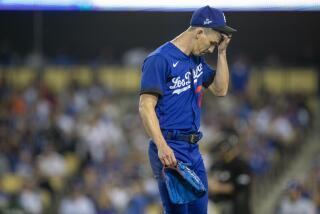Steroids Become an Issue : Baseball: Many fear performance-enhancing drug is becoming prevalent and believe something must be done.
- Share via
Anabolic steroids, the performance drugs of the 1980s in football, track, weightlifting and some other sports, apparently have become the performance drugs of the ‘90s in major league baseball.
“We all know there’s steroid use, and it’s definitely become more prevalent,” said Randy Smith, general manager of the San Diego Padres. “The ballplayers all know the dangers of it. We preach it every year.
“But because there’s so much money to be made these days, guys are willing to pay the price now and will pay the piper later.
“I can understand it’s a difficult choice for some players. They know it can take five years off their lives, but then they say, ‘OK, so I die when I’m 75 instead of 80.’ ”
Just how prevalent is steroid use?
“I think 10% to 20%,” Smith said. “No one has any hard-core proof, but there’s a lot of guys you suspect.”
Said one American League general manager, “I wouldn’t be surprised if it’s closer to 30%, although most people will say it’s about 5% to 10%. We had one team in our league a few years ago that the entire lineup may have been on it.
“Come on, you just don’t put on 50 pounds of muscle overnight, and hit balls out of stadiums. I’m seeing guys now who were washed up five years ago, and now they’ve got bat speed they’ve never had before. It’s insane.
“You can usually pick them out, because eventually they start to get back problems.”
There is no testing for steroid use in baseball. No baseball player has ever been suspended for steroid use, and even if a player were caught using steroids, baseball demands no penalty and offers no rehabilitation.
“I’d love to see testing myself,” said Chicago White Sox first baseman Frank Thomas, one of baseball’s big men at 6 feet 5 and 268 pounds. “If it can be done in every other sport, why not ours? At least it would get rid of the suspicions.”
Added Thomas, who said he gained 35 pounds during the off-season, “I went in to see my doctor this winter, and he even asked me, ‘Hey, are you on steroids?’ It’s a question people are going to ask, especially [of] the big power hitters, unless something is done about it.”
Said Padre all-star right fielder Tony Gwynn, “It’s like the big secret we’re not supposed to talk about, but believe me, we wonder just like the rest of people. I’m standing out there in the outfield when a guy comes up, and I’m thinking, ‘Hey, I wonder if this guy is on steroids.’
“I think we all have our suspicions who’s on the stuff, but unless someone comes out and admits to it, who’ll ever know for sure?”
Bud Selig, acting commissioner, said the topic was last addressed by owners in a private meeting a year or 18 months ago. The conclusion was that no one had any evidence that steroid use should be a concern.
“If baseball has a problem, I must say candidly that we were not aware of it,” Selig said. “It certainly hasn’t been talked about much. But should we concern ourselves as an industry? I don’t know. Maybe it’s time to bring it up again.”
Said Kevin Malone, the Montreal Expos’ general manager, “I’d like to see some measures taken. The game of baseball is supposed to be about purity and fairness, but if individuals are going around and getting an unfair advantage because of steroid use, we should do something about it.
“You hear the rumors that usage is way up, and it would be nice to know if those are accurate.”
The Major League Players Assn., which prohibits random drug testing for any non-drug offender at the major league level, said steroid testing would violate individual rights. Without the consent of the players, there won’t be steroid testing soon.
“We’ve got guys out there willing to risk their lives just for a piece of glory,” Dodger relief pitcher Todd Worrell said. “But the problem is baseball’s inability to set a policy and stand by the policy. If they set a policy, and stood up to it, it’d be different.
“But right now, there’s no policy and nobody out there to enforce it.
“And until we do, we’ll continue to have [steroid] problems, finger-pointing and controversy.”
More to Read
Go beyond the scoreboard
Get the latest on L.A.'s teams in the daily Sports Report newsletter.
You may occasionally receive promotional content from the Los Angeles Times.










